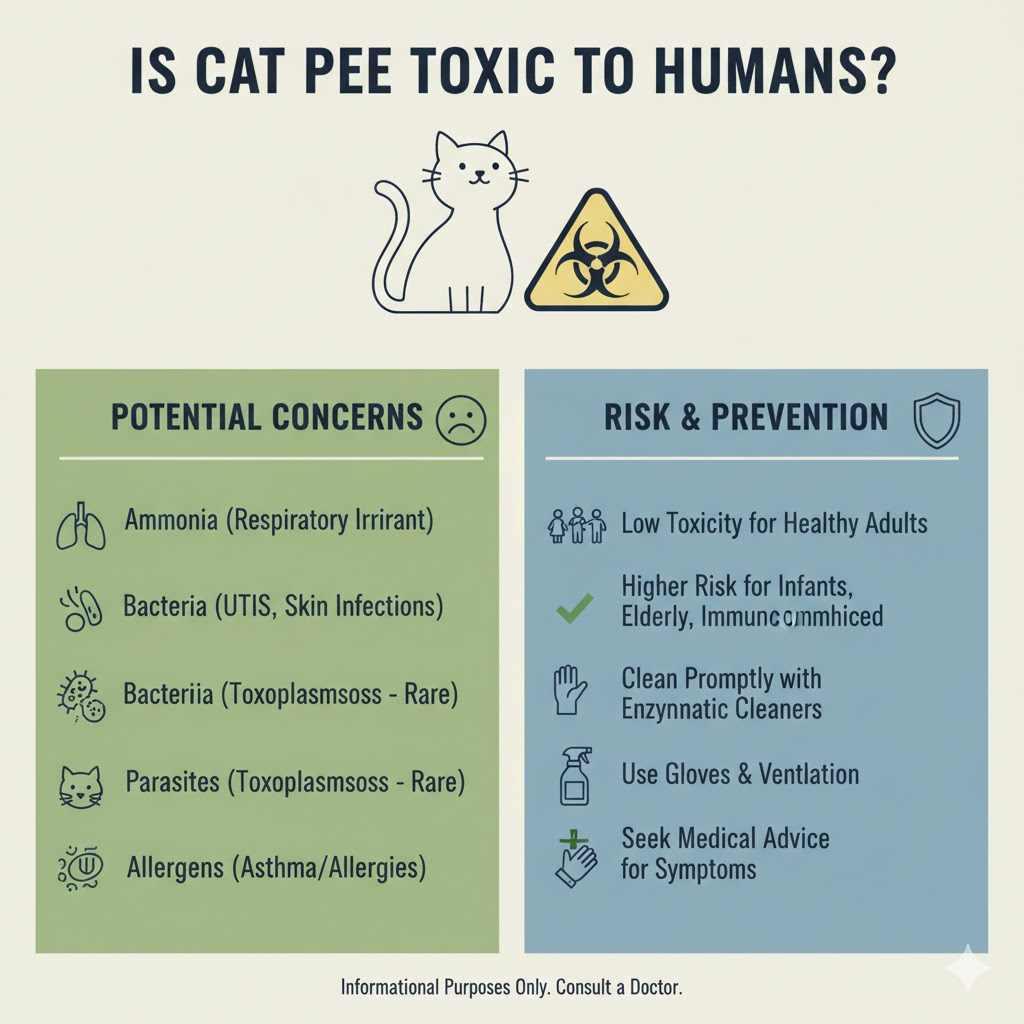If you’ve ever dealt with cat pee on your carpet, couch, or clothes, you already know how powerful the smell can be. But beyond the odor, many cat owners wonder — is cat pee actually toxic to humans?
This guide dives deep into what cat urine contains, how it can affect human health, and how to safely clean it so your home stays healthy and odor-free.
What Exactly Is Cat Urine Made Of?
Cat urine is more than just water. It’s a complex chemical mix that becomes stronger as it sits and evaporates.
Here’s what it typically contains:
- Urea – breaks down into ammonia, which causes the strong smell.
- Creatinine – a waste product from muscle metabolism.
- Uric acid – forms crystals that cling to surfaces and make odors hard to remove.
- Bacteria and pheromones – give cat urine its distinct scent signature.
When fresh, cat pee isn’t immediately dangerous — but as it breaks down, ammonia levels rise, and that’s where the potential toxicity begins.
Is Cat Pee Toxic to Humans?
The Short Answer: Yes, It Can Be
While cat pee isn’t a “poison” in the traditional sense, the ammonia and bacteria in old or concentrated urine can be harmful if you’re exposed to them for long periods — especially in poorly ventilated spaces.
Health Risks of Cat Urine Exposure
- Respiratory Problems
- Ammonia fumes can irritate your nose, throat, and lungs.
- People with asthma or allergies are at higher risk.
- Headaches & Nausea
- Inhaling strong urine odors for hours can trigger dizziness and nausea.
- Skin Irritation
- Touching contaminated surfaces can cause redness, itching, or rash.
- Eye Irritation
- Ammonia vapors can sting or burn your eyes.
- Potential for Infection
- Cat pee can contain bacteria like Leptospira, which can lead to Leptospirosis if it enters your bloodstream through cuts or mucous membranes (rare but serious).
Who Is Most at Risk?
- Children and elderly people – weaker immune systems
- Pregnant women – should avoid cleaning cat litter boxes due to risk of toxoplasmosis
- Asthma or allergy sufferers – highly sensitive to airborne irritants
- People with open wounds – more likely to develop skin irritation or infection

Can the Smell of Cat Pee Affect Your Health?
Yes — even if you don’t touch it directly. Prolonged inhalation of strong ammonia vapors can cause:
- Throat irritation
- Coughing or wheezing
- Watery eyes
- Fatigue or dizziness
In extreme cases (for example, hoarding situations), ammonia exposure can cause long-term respiratory issues.
How to Safely Clean Cat Pee?
If your cat pees outside the litter box, cleaning it properly is essential to avoid both smell and health problems.
Step-by-Step Cleaning Method
- Wear gloves and open windows for ventilation.
- Blot the area with paper towels — don’t rub!
- Use an enzyme-based cleaner (these break down uric acid crystals).
- Avoid bleach or ammonia cleaners — they can make the smell worse.
- Rinse and dry thoroughly.
- Repeat if necessary until the smell is completely gone.
Pro Tip: Sprinkle baking soda overnight to neutralize lingering odors. Vacuum it up in the morning.
Preventing Cat Pee Accidents
Cats usually pee outside the box for a reason. Common causes include:
- Dirty litter box
- Stress or anxiety
- Medical issues (UTI, bladder stones, diabetes)
- Territorial marking
Tips to Stop It From Happening Again
- Keep one litter box per cat + one extra.
- Scoop daily and wash weekly.
- Place boxes in quiet, accessible spots.
- Visit a vet if accidents keep happening.
(Internal link placeholder: [Why Is My Cat Peeing Everywhere?])
When to See a Doctor (for You)
If you experience any of the following after frequent exposure to cat urine, contact a medical professional:
- Persistent coughing or shortness of breath
- Headaches or dizziness in rooms with cat pee odor
- Red or irritated skin after cleaning urine
- Flu-like symptoms that don’t go away
Your doctor may recommend tests for ammonia exposure or possible bacterial infection.
Home Remedies vs. Professional Cleaning
DIY Options
- White vinegar and water mix (1:1)
- Baking soda
- Hydrogen peroxide (3%) for carpets
Professional Cleaning
If the smell lingers after multiple attempts, it’s worth calling professional odor removal services. They use industrial-grade enzyme treatments that eliminate odor at the molecular level.
Is Cat Pee Dangerous to Pets Too?
Yes — if you have other pets, especially dogs or small animals, the ammonia from concentrated cat urine can irritate their airways too.
Always clean immediately and keep litter boxes in well-ventilated areas.
FAQs
Q1. Can cat urine cause breathing problems?
Yes. Prolonged exposure to ammonia in cat urine can lead to coughing, wheezing, or chest tightness, especially in people with asthma.
Q2. Can you get sick from cleaning cat pee?
It’s possible if you don’t wear gloves or inhale strong fumes in closed spaces. Always use protection and open windows.
Q3. Is dried cat pee still toxic?
Old, dried urine still releases ammonia and uric acid crystals that can trigger allergic reactions or headaches.
Q4. Can cat pee cause mold or bacteria growth?
Yes. If it soaks into carpet or wood, it can encourage bacterial growth and mildew.
Q5. Does cat pee smell mean infection in cats?
A very strong or unusual urine odor could signal infection or dehydration. It’s best to get your cat checked by a vet.
Conclusion
Cat pee isn’t lethal, but it can be toxic when left uncleaned or inhaled over time. The ammonia and bacteria in cat urine pose real health risks — from mild irritation to serious respiratory issues.
The key is quick action:
- Clean spills immediately with enzyme cleaners
- Keep litter boxes fresh
- Ventilate your home well
- See a vet if your cat is peeing outside the box frequently
By staying proactive, you’ll protect both your health and your feline friend’s comfort.
